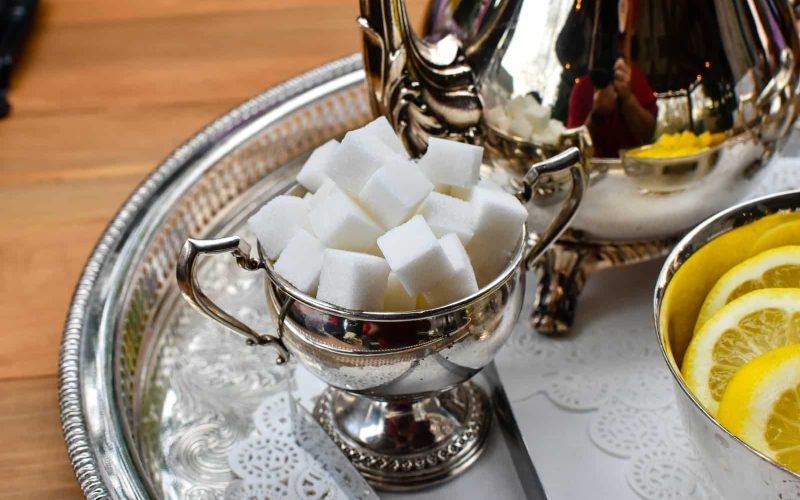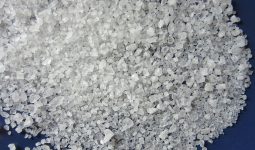When baking, sugar is often used to sweeten the end product.
But for those looking for substitutes for sugar in baking, some great substitutes can offer equal sweetness without the calories or potential negative health effects associated with regular sugar.
Examples of substitutes for sugar in baking include honey, molasses, coconut sugar, date syrup, stevia, and artificial sweeteners like aspartame or sucralose.
Many of these substitutes for sugar in baking will require you to experiment with different amounts since they can have varying degrees of sweetness compared to regular sugar.
However, they are all worth trying as they are much healthier alternatives than regular white or brown sugar.
1. Monk Fruit “sugar.”
Monk fruit sweetener, also known as Luo Han Guo, is starting our list of substitutes for sugar in baking.
It’s being used as a sugar substitute in baking due to its zero-calorie properties, making it an attractive option for those wanting to manage their sugar intake.
The monk fruit extract has no calories and has been shown to have some anti-carcinogenic components that can benefit health overall.
Furthermore, the sweetness of monk fruit sweetener is 300 times more powerful than regular sugar but without any added sugars or artificial sweeteners.
As such, it can be used as a one-for-one replacement for regular sugar in most recipes with few adjustments.
Because it’s sweeter, less monk fruit can be used compared to the same amount of regular sugar.
In comparison with other popular substitutes for sugar in baking, like honey, agave, or maple syrup – monk fruit sweetener provides a healthier alternative while still providing great-tasting treats!
2. Ripe Banana
Ripe banana is also on our list of substitutes for sugar in baking. Baking with ripe bananas is an easy way to add natural sweetness and flavor to any recipe while reducing refined sugars.
Ripe bananas have a naturally higher sugar content than unripe bananas, making them perfect substitutes for refined sugars in sweet treats.
They can be used as one-to-one substitutes for sugar in baking recipes and add a unique flavor you can’t get from using artificial sweeteners.
Replacing the sugar in your recipes with ripe bananas offers several nutritional benefits, such as essential vitamins and minerals like potassium and magnesium.
3. Molasses
Molasses can be used as substitutes for sugar in baking. The flavor is slightly different but not unpleasant, giving baked goods a nice color and depth of flavor.
Molasses is somewhat less sweet than regular sugar, so you may need to add more to get the same sweetness level.
It also contains other natural nutrients like minerals, vitamins, and antioxidants, making molasses an attractive option for alternative sweeteners.
Additionally, many believe molasses can act as healthier substitutes for sugar in baking because it still provides sweetness without any additional chemicals or processing.
4. Fruit Juice
Fruit juice concentrates can be used as substitutes for sugar in baking. The natural sweetness of fruit juice concentrates means they can decrease the sugar needed in a recipe.
In addition, because the concentrate is already sweetened and concentrated, you will use less than if you added regular fruit purees or other liquid ingredients that contain some sweetness.
When substituting with a juice concentrate, adjust the recipe’s liquid content accordingly, as it may change due to the concentrate’s heightened sweetness level.
5. Brown Rice Malt Syrup
Brown rice malt syrup is also one of the increasingly popular substitutes for sugar in baking, providing a mild and sweet flavor with no bitterness associated with alternatives such as raw cane sugar.
Brown rice malt syrup is also believed to have a lower glycemic index than sucrose and glucose, making it a desirable option for those who want to reduce their added dietary sugar intake.
In addition, brown rice malt syrup is vegan, gluten-free, and boasts a rich source of natural minerals.
As such, you can create interesting flavor combinations by using brown rice malt syrup instead of traditional sucrose or high fructose corn syrups while still delivering delicious results.
6. Agave Nectar
Agave nectar is an increasingly popular sweetener derived from the agave plant and is increasingly used as a sugar substitute in baking.
It has a lower glycemic index than regular sugar, so it won’t cause your blood sugar to spike nearly as much as traditional sweeteners.
It has a particularly syrupy texture and mild flavor that adds sweetness without overpowering other flavors, making it ideal for baking.
Furthermore, agave nectar, one of the substitutes for sugar in baking, can be used to caramelize foods, draw out moisture, and flash-fry foods due to its relatively high levels of natural fructose.
As such, it’s perfect when paired with ingredients like chocolate, peanut butter, nuts, cinnamon, and more, and perfect for use in baked goods!
7. Maple Syrup
Maple syrups can be great sugar substitutes when baking. Not only does it provide sweetness, but it also helps to bring out many other flavors in your recipes.
Maple syrup is naturally rich in vitamins and essential minerals, such as manganese and zinc – while white sugar is virtually void of any nutritional value.
The maple syrup flavor adds a layer of complexity to baked goods with its subtle notes of caramel, hazelnut, and vanilla that regular granulated sugar cannot achieve.
With this added nutrition and fun flavor, it’s no wonder why so many people are opting for maple as substitutes for sugar in baking their baking creations!
8. Honey
Honey, one of the best substitutes for sugar in baking, has some unique and desirable properties.
It has a distinctive flavor, adds moisture and texture to baked goods, and can help give an appealing golden brown color.
Honey is also lower on the glycemic index than refined sugar, which makes it a useful choice for those who follow a low GI diet.
Different considerations must be considered when substituting honey for sugar in baking due to its higher liquid content, so recipes may need to be adjusted accordingly.
9. Erythritol
Erythritol is a naturally occurring sugar alcohol with no calories or carbohydrates and can be used as a sugar-free substitute in baking.
It also doesn’t raise blood sugar levels, making it a great option for diabetics.
Erythritol, which is one of the substitutes for sugar in baking, works best when combined with other sweeteners to get the right texture and sweetness.
It can be used in various baked goods, from cakes, muffins, bread, and cookies to pie fillings and icings.
Baked goods made with erythritol tend to be denser than those made with white sugar, but this can easily be compensated by adding more liquid or air when baking.
In addition, erythritol has numerous health benefits for people who cannot consume regular sugar or any other sweetener due to health restrictions such as diabetes or obesity.
10. Dates
Dates are nutrient-packed dried fruits that can be used as healthy substitutes for sugar in baking.
When replacing regular refined sugar with dates, you get more fiber, vitamins, and minerals from a bag of date fruits.
Dates also contain essential antioxidants and beneficial phytonutrients, which may reduce inflammation and promote overall health.
Additionally, when using dates to sweeten your baked goods, you can significantly cut down on the glycemic value of the dish, making it ideal for those watching their sugar intake or suffering from diabetes.
11. Applesauce
Lastly, apple sauce can be among the great substitutes for sugar in baking.
It adds natural sweetness much healthier than sugar, and lends an earthy note to baked goods like pies and muffins.
Aside from its sweet properties, apple sauce also gives baked goods moisture without the added fat of oil or butter and flavor complexity.
Often just a small amount in exchange for some sugar in any recipe will lead to a delicious result.
When baking with apple sauce, factor in its water content to keep your desired ratio of wet-to-dry ingredients correct.
Conclusion
Substitutes for sugar in baking are the perfect way to enjoy desserts without added sugar.
They come in various forms, from natural sweeteners like honey and maple syrup to artificial sweeteners such as aspartame and saccharin.
Each of the types of substitutes for sugar in baking has its unique properties and flavors, allowing bakers to create delectable treats that are just as delicious as those made with traditional sugar but much better for your health.
Ultimately, experimenting with different types of substitutes for sugar in baking is the key to finding the one that works best for you.







